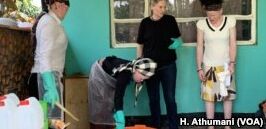正文
VOA慢速英语:白化病妇女争取被接纳
Stibiri Fiona of Uganda was born with the medical condition known as albinism.
Her body lacks the natural dark brown or black coloring that is in the skin of many African people. As a result, she and others with the condition have unusually light skin, hair and eyes.
In many countries, centuries-old beliefs about people with albinism create danger for those like Fiona. For while the medical cause is understood, the body parts of those with albinism are used in ceremonies that are said to bring wealth and good luck. People who want those body parts then attack individuals with the condition: cutting off their hair, fingers, arms, ears, and even murdering them.

"Someone who abuses my nature, I feel so, so, so bad and so small. I feel like even shedding tears. I feel like going even to collect my mother in the grave to ask her why she produced me in such a color."
Life is difficult for Ugandan women with albinism. One person who helps them is Nawejje Doreen Mayanja, who heads a group called Women and Children with Albinism. She works near the city of Kampala.
"When you are qualified, it is a bit competitive to get a job. And just because most of these women were denied the chance to go to school, they are not educated, they are not empowered. You find they are living below the poverty line."
Albinism is a genetic condition. In addition to having little coloring in the skin, people with albinism may have problems with their eyesight and are at a higher risk for skin cancer.
Working as a primary school teacher, Fiona was married for eight years and has four children. Her husband asked her to stop working because he believed her albinism would make him rich.
When that did not happen, she says his father ordered her to leave their home. Now she lives in a one-room house with her children. She has not been able to find a teaching job.
"When I went there to apply for vacancies, they refused. They said children will fear you. Even other teachers looked at me as maybe a curse. So, as for now, I don't work."
A 2017 United Nations report says that people with albinism face discrimination and barriers that prevent them from taking part equally in society. As a result, they are more likely to experience social exclusion and poverty.
Safia Nalule is a member of Uganda's legislature. She represents people with disabilities. On March 7, she offered a bill in parliament on the social, economic and cultural rights of people living with albinism.
"I am bringing this bill, first of all, to ask for great awareness raising about persons with albinism. That they are not different from us. It is only a genetic disorder which actually brings about albinism."
Albinism in other African countries
The World Health Organization reports that albinism is found in 1 out of 3,000 Ugandans.
Few people with albinism are killed in the country. But a report by the Ugandan parliament says many are taken by force to Tanzania and parts of Kenya for human sacrifice.
Uganda is not the only country where people with albinism are asking for their rights. Nearby in Malawi, 300 people, most of them with albinism, demonstrated in the past week near the home of the president Peter Mutharika. The demonstrators wanted to meet with him to discuss the killing of people with albinism.
I'm Jill Robbins.
Halima Athumani reported on this story for VOA News. Jill Robbins adapted her report for Learning English. George Grow was the editor.




 手机网站
手机网站